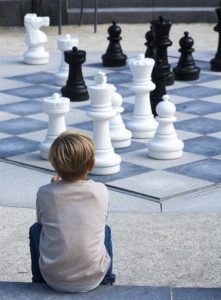Quoting part of the Introduction from Teaching Chess in the 21st Century,
“Benjamin Franklin wrote in 1779 that the game of chess “is not merely an idle amusement (since) life is a kind of chess, in which we have often points to gain, and competitors or adversaries to contend with, and in which there is a vast variety of good and evil events that are in some degree the effects of prudence or the want of it.” Franklin suggests that playing chess develops foresight, circumspection, perseverance, and sportsmanship.
Godfrey Harold Hardy, a prominent British mathematician famous for his achievements in number theory, once said, “A chess problem is an exercise in pure mathematics.” ….
Today, educators and parents have discovered that chess is a wonderful way to teach young children mathematical concepts and important thinking skills that they can use their entire life. Chess also has connections to standards in the fields of language arts (reading, writing, oral presentation), social studies (geography – longitude and latitude, mapping), and science (graphing and critical thinking skills).
Here are some other benefits of learning chess:
- Improves cognitive skills (including concentration, pattern recognition, decision making, algebraic and geometric thinking, problem-solving, spatial reasoning, and critical thinking)
- Improves self-confidence and self-worth
- Increases attention span
- Increases memory capacity
- Encourages understanding of choice and consequences for problem- solving…helps students realize that they are responsible for their actions and must accept the consequences of those actions
- Offers a logical pattern and critical-thinking system
- Provides competition, fostering interest and promoting mental alertness
- Offers a variety of quality analytical problems from which to choose
- Teaches good sportsmanship
- Improves communication through written and oral presentation skills
- Creates a learning environment organized around games, which is one of the most motivational tools in a teacher’s repertoire to encourage problem-solving and spend time quietly immersed in logical thinking.
Many studies show that chess helps children with cognitive development and increases math and verbal test scores. Educators have also noted that chess helps to raise self-esteem.”
As a Civil Engineer and Rocket Scientist, there is no doubt in my mind that chess teaches logical-thinking, decision-making, and how to methodically evaluate different choices or moves in a logical manner better than any other teaching vehicle.
Patience is one of the most important things chess teaches children. Once they learn to slow down and take their time, they discover a whole new world. They then see the complexitites of different chess positions that need to be worked out; that is when time-management skills are introduced.

